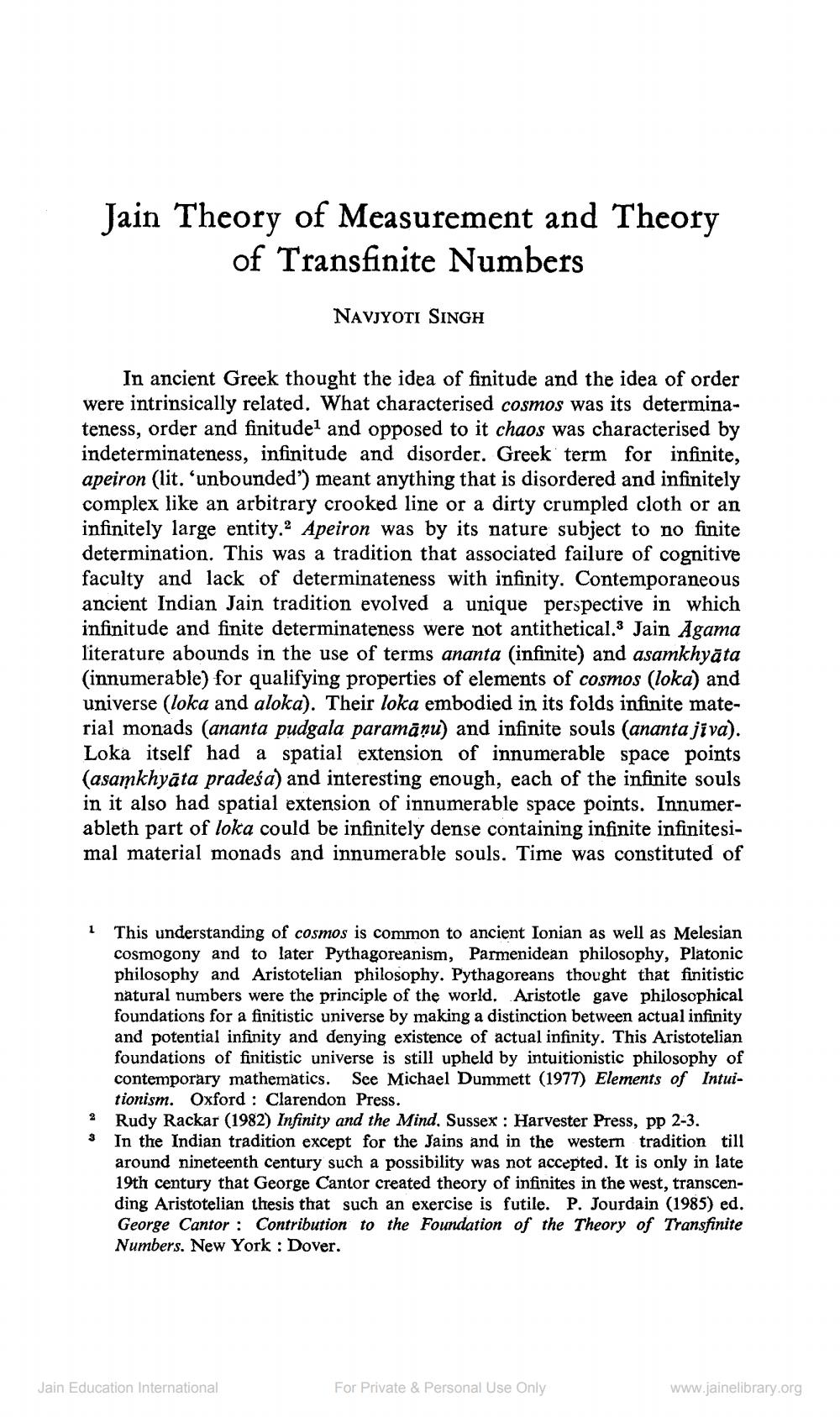Book Title: Jain Journal 1990 07 Author(s): Jain Bhawan Publication Publisher: Jain Bhawan Publication View full book textPage 6
________________ Jain Theory of Measurement and Theory of Transfinite Numbers NAVJYOTI SINGH In ancient Greek thought the idea of finitude and the idea of order were intrinsically related. What characterised cosmos was its determinateness, order and finitude1 and opposed to it chaos was characterised by indeterminateness, infinitude and disorder. Greek term for infinite, apeiron (lit. 'unbounded") meant anything that is disordered and infinitely complex like an arbitrary crooked line or a dirty crumpled cloth or an infinitely large entity.2 Apeiron was by its nature subject to no finite determination. This was a tradition that associated failure of cognitive faculty and lack of determinateness with infinity. Contemporaneous ancient Indian Jain tradition evolved a unique perspective in which infinitude and finite determinateness were not antithetical. Jain Agama literature abounds in the use of terms ananta (infinite) and asamkhyāta (innumerable) for qualifying properties of elements of cosmos (loka) and universe (loka and aloka). Their loka embodied in its folds infinite material monads (ananta pudgala paramāņu) and infinite souls (ananta jiva). Loka itself had a spatial extension of innumerable space points (asamkhyāta pradeśa) and interesting enough, each of the infinite souls in it also had spatial extension of innumerable space points. Innumerableth part of loka could be infinitely dense containing infinite infinitesimal material monads and innumerable souls. Time was constituted of 1 This understanding of cosmos is common to ancient Ionian as well as Melesian cosmogony and to later Pythagoreanism, Parmenidean philosophy, Platonic philosophy and Aristotelian philosophy. Pythagoreans thought that finitistic natural numbers were the principle of the world. Aristotle gave philosophical foundations for a finitistic universe by making a distinction between actual infinity and potential infinity and denying existence of actual infinity. This Aristotelian foundations of finitistic universe is still upheld by intuitionistic philosophy of contemporary mathematics. See Michael Dummett (1977) Elements of Intuitionism. Oxford: Clarendon Press. 2 Rudy Rackar (1982) Infinity and the Mind, Sussex Harvester Press, pp 2-3. 3 In the Indian tradition except for the Jains and in the western tradition till around nineteenth century such a possibility was not accepted. It is only in late 19th century that George Cantor created theory of infinites in the west, transcending Aristotelian thesis that such an exercise is futile. P. Jourdain (1985) ed. George Cantor: Contribution to the Foundation of the Theory of Transfinite Numbers. New York: Dover. Jain Education International For Private & Personal Use Only www.jainelibrary.orgPage Navigation
1 ... 4 5 6 7 8 9 10 11 12 13 14 15 16 17 18 19 20 21 22 23 24 25 26 27 28 29 30 31 32 33 34 35 36 37 38 39 40 41 42 43 44 45
